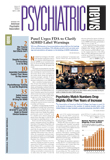Body dysmorphic disorder is not a trivial illness, Katharine Phillips, M.D., a professor of psychiatry at Brown University and a body dysmorphic disorder authority, stressed during a recent interview.
“My clinical experience suggests that patients with the illness suffer tremendously and are often suicidal and seriously ill,” she said.
In addition, she pointed out, “the disorder appears to be relatively common, yet very little systematic research has been conducted on it.” Thus, a decade or so ago, she decided to start studying it herself, learning, among other things, that the SSRI antidepressants can improve daily functioning in people with the disorder (Psychiatric News, October 15, 2004).
And now Phillips, along with Robert Stout, Ph.D., also a professor of psychiatry at Brown, has conducted a study to examine longitudinal associations between the disorder and three mental illnesses that often accompany it—major depression, obsessive-compulsive disorder (OCD), and social phobia.
For one to three years, they followed the clinical outcomes of 161 subjects who had body dysmorphic disorder and one of three other disorders: 37 percent had a major depressive disorder, 33 percent had social phobia, and 26 percent had OCD.
Improvement in body dysmorphic disorder and major depression often occurred hand in hand, the researchers found, with improvement of each disorder significantly predicting remission of the other.
“I thought we would see improvement in body dysmorphic disorder predicting major depressive disorder remission,” Phillips said,“ but I didn't know what we would find regarding the converse.”
As for body dysmorphic disorder and OCD, improvement in OCD significantly predicted remission of body dysmorphic disorder, but not vice versa.
With regard to body dysmorphic disorder and social phobia, improvement in one did not significantly predict remission of the other.
Thus, body dysmorphic disorder seems to be closely related to major depression, somewhat related to OCD, and not related to social phobia, Phillips and Stout concluded in their study report, which is in press with the Journal of Psychiatric Research. Nonetheless, they wrote,“ Family, twin, and adoption studies, and—most important—studies of etiology and pathophysiology are needed to elucidate the nature of the disorders' relationship to one another.”
Furthermore, they stressed, body dysmorphic disorder does not appear to be simply an expression of major depression or OCD because body dysmorphic disorder persisted in more than half of subjects who remitted from the two co-occurring disorders.
The study was funded by the National Institute of Mental Health.
An abstract of “Associations in the Longitudinal Course of Body Dysmorphic Disorder With Major Depression, Obsessive-Compulsive Disorder, and Social Phobia” can be accessed at<www.sciencedirect.com> by clicking on “Browse A-Z of journals,” “J,” the“ Journal of Psychiatric Research,” and “Articles in press.” ▪
